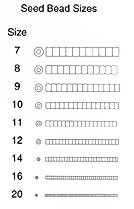Seed Beads

Seed beads are sized according to aughts (not
millimeters) ~ as strung beads per 20mm or 3/4 inch length. The
larger the number, the smaller the bead. The conversion chart below
is for guidance only and all measurements provided are approximate.
My seed beads
are sold by weight or by *hank* where noted.
Pre-strung hanks may differ in size, strand count and weight depending on
bead size, manufacture and country of origin.
Loose
beads come in zipper bags, packaged by weight in grams or ounces.
One ounce (1 oz.) packages contain approximately 28-30 grams.
**Bead colors may vary slightly from photos depending on monitor settings**

|
Bead |
Size |
Beads
Per Inch |
Needle
Size |
Thread
Size (Nymo) |
|
9/o |
2.7 mm |
14
( 80
beads per gram ) |
10 |
B or D |
|
10/o |
2.3 mm |
17
( 90
beads per gram ) |
10 |
B or D |
|
11/o |
2.1 mm |
19
( 135
beads per gram ) |
11 |
A or B |
|
12/o |
1.9 mm |
21
( 145
beads per gram ) |
12 |
A or B |
|
13/o |
1.7 mm |
23
( 150
beads per gram ) |
13 |
A or 0 |
|
14/o |
1.6 mm |
25
( 258
beads per gram ) |
15 |
0 or 00 |
|
15/o |
1.5 mm |
28
( 260
beads per gram ) |
15 |
0 or 00 |
|
18/o |
1.1 mm |
40 |
15 |
00 or 000 |
|
20/o |
1.0 mm |
40+
( 930
beads per gram ) |
15 |
000 |
|
22/o |
0.9 mm |
50+ |
15 |
000 |
|
24/o |
!!! |
50+ |
? |
000 |
|
|
|
|
|
|
 |
|
|
|
|
|
|
 |
* * CZECH
seed beads are uniform in size with smaller holes and thicker walls. They
are best known for their traditional smooth, rounded shape and wide range
of colors.
* * JAPANESE
seed beads are very uniform in size but more cylindrical in shape, with
large holes and thinner walls. Most popular for their wide variety of
colors and finishes.
* * FRENCH
seed beads are more irregular in size and shape, but have larger holes
than the Czech seed bead with colors that are the most durable and resist
fading. They are most popular for traditional beadwork and artifact
reproductions.
* * ITALIAN
seed beads are no longer being produced, and are extremely rare. Those
still on the market are from vintage stock
and are highly prized by
collectors. The 24/0 seed bead is the smallest ever made and used
primarily for restoration and reproduction work for 1700 thru early 1900
beadwork. Once referred to as "sand" beading, the intricate work produced
from these tiny micro beads often looks more like cloth than beadwork.
|